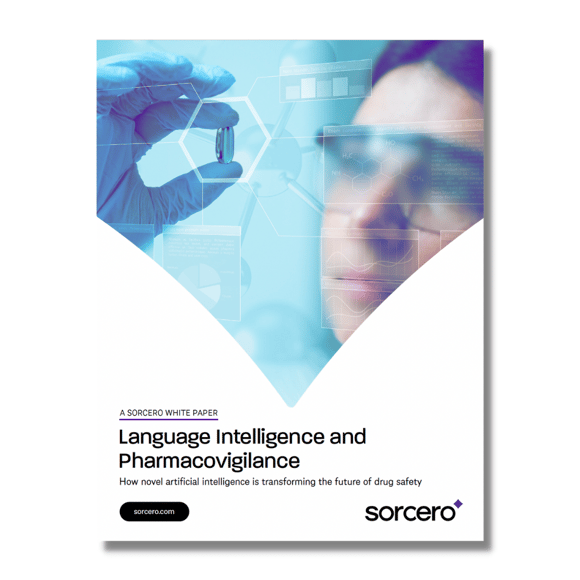Sorcero, the leading omnichannel analytics platform for Life Sciences, has released its new white paper on the evolving role of novel artificial intelligence in Pharmacovigilance.
New White Paper: How novel artificial intelligence is transforming the future of drug safety
Pharmacovigilance (PV) is the sum of scientific activities that detect, assess, understand, and prevent drug-related problems. Despite the maturity of PV, it evolves with the demands of changing market conditions.
Today, the volume and variety of scientific data is escalating across new and existing sources. This progression has taken hold alongside relentless shifts to implement new regulations, requirement variances amongst global regulatory authorities, and the scarcity of available expertise, which had presented significant challenges even prior to the Great Resignation¹.
A large pharma company processes approximately 700,000 adverse event (AE) cases annually. The volume of cases and safety databases continues to increase2 in size and, in some cases, scope. Consequently, the demand for data analysis to identify new signals rises proportionally, if not exponentially. Investments in resources have not increased alongside the expansion of data and requirements.
These factors are among those driving PV to discover and adapt processes to uncover new solutions.
Artificial Intelligence is making critical strides to address these challenges.
Natural Language Processing (NLP) enables computers to recognize language and structure text, and its value to pharmacovigilance has been thoroughly established3. FDA is already exploring its use broadly in initiatives4 by ingesting the unstructured data in safety case reports, monitoring medical literature for signals of ADRs, and leveraging abstracted Electronic Health Records (EHRs) for further data extraction and analyses.
Today, there is an abundance of Commercially Available Off the Shelf (COTS) NLP models. However, not all algorithms are equal in design. Consider: most off-the-shelf models on the market are trained on general-domain language. This often means they are best suited for general-domain language tasks. When applied to biomedical language, their performance suffers significantly.
For PV, solutions now exist within a series of patented breakthroughs that go beyond the capabilities of general-domain NLP. Language Intelligence (LI), termed by Sorcero, custom-tunes the most powerful artificial intelligence (AI) models on the market to the biomedical language of life sciences workflows.
Through adaptive training and learning, Language Intelligence utilizes the most advanced deep-learning models and comprehensive domain-specific ontologies to organize and understand how language is used in Life Sciences. This enables life sciences to ingest, enrich, and analyze content from the world's largest set of open access scientific sources, as well as unstructured data, media, and content types. This includes PDFs, Powerpoint, audio, and video sources.
The benefits of this technology grow over time. Language Intelligence learns and adapts from each interaction. It builds an understanding of context as an intermediator of information and insights, which then enhances its ability to augment stakeholder expertise. This could provide the toolset for pressured PV teams to overcome the data deluge and excel in their core mission: patient safety.
- Safety Case Report Processing
- Literature and Social Media Monitoring
- Real World Data (RWD)
Find actionable steps on:
- How to adopt AI solutions in PV
- How to trust AI solutions in PV
Download the White Paper: Language Intelligence and Pharmacovigilance
____
References:
1. Pazzanese C. Harvard economist sheds light on 'great resignation'. Harvard Gazette. October 20, 2021. https://news.harvard.edu/gazette/story/2021/10/harvard-economist-sheds-light-on-great-resignation/. Accessed May 17, 2022.
2. Louie AS. IDC MarketScape: Worldwide life science drug safety services 2019–2020 vendor assessment — building for innovation. IDC. Published December 2020. Accessed May 17, 2022. https://www.idc.com/getdoc.jsp?containerId=US45863116
3. Murali K, Kaur S, Prakash A, Medhi B. Artificial intelligence in pharmacovigilance: Practical utility. Indian J Pharmacol. 2019;51(6):373-376. doi:10.4103/ijp.IJP_814_19
4. DIA. DIA Global Forum. Three Good Reasons to Use Artificial Intelligence in Pharmacovigilance. December 2021. Accessed May 17, 2022. https://globalforum.diaglobal.org/issue/december-2021/
%20(1).png?width=300&name=Blog%20Headers%20(1200%20%C3%97%20600%20px)%20(1).png)


